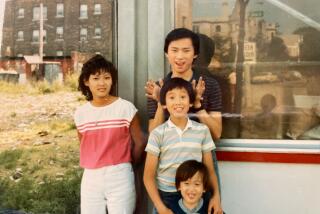A Virus Cures a Silence
- Share via
LONDON — Protest does not come naturally to Christine Yau. Since emigrating from Hong Kong 16 years ago, the petite and polite restaurateur has been a community volunteer in Chinatown and an aide to the elderly. Not a rabble-rouser.
But foot-and-mouth disease changed that. When the British press reported that illegally imported meat destined for a Chinese restaurant in Newcastle was the likely source of the epidemic ravaging the country’s livestock, Yau took to the streets for the first time in her half-century life.
Yau joined a thousand other members of Britain’s Chinese community last month on a march from London’s Chinatown to the Agriculture Ministry to protest what they considered a smear campaign to make them into scapegoats for the outbreak.
“My head asked whether this was the right thing to do, but my heart said, ‘Yes this is right, we have stayed silent too long,’ ” Yau said. “This allegation affected the livelihood of the Chinese people.”
The unsubstantiated allegation--”Sheep and Sow Source” as the Mirror tabloid put it in an unfortunate play on words--did what 150 years of insults and racial epithets had not done before: made Britain’s Chinese fight back.
The perceived attack brought immigrants and British-born Chinese together for meetings that required translation between those who spoke no English and those who spoke no Mandarin. It united restaurant and takeout associations with dot-com devotees who used the Internet to mobilize the troops--particularly through a year-old Web site known as DimSum Food for Thought at https://www.dimsum.co.uk.
The London demonstration was followed by a similar march in Manchester and produced the Chinese Civil Rights Action Group to monitor this and other issues of importance to the Chinese in Britain.
“We have swallowed our pride for too long,” said Jabez Lam, one of the group’s leaders. “We are none the wiser whether this allegation came from the Ministry of Agriculture or the media, but the Chinese community is the victim.”
And that, he says, is what the small but emboldened community can no longer tolerate.
The first Chinese immigrants to Britain--indeed, to Europe--were employees of the East India Co., sailors and traders on the Shanghai-to-Liverpool line who pulled into port in the late 18th century and settled. At the turn of the 20th century, there were only about 500 Chinese in Britain, many of them operating small shops and cafes that catered to Chinese seamen. About 30 Chinese businesses dotted the Limehouse area of east London, which by 1914 had become known as Chinatown.
“The British were, however, far from welcoming,” according to a thumbnail history on the London Chinatown Web site, https://www.chinatown-online.co.uk. “Chinese sailors were considered a direct threat to their British counterparts. . . . The Chinese were almost universally suspected of being lawless opium addicts who were unkempt and dirty.”
That early Chinatown was destroyed in the Nazi blitz of London, but British soldiers returning home from the Far East in the 1950s created a sudden upsurge in demand for Chinese cuisine.
The popularity of two or three Chinese restaurants in the West End drew other establishments to the low-rent streets of Soho, which, in turn, attracted agricultural workers from Hong Kong who had been forced out of their jobs by changes in the world’s rice markets. These workers eventually brought their families and built other businesses, giving birth to today’s Chinatown.
Chinese communities sprung up in Manchester and Newcastle as well as London and Liverpool, and increasingly prosperous and educated families moved to the suburbs. There are at least 167,000 ethnic Chinese in Britain, according to official figures for 1998, but that number is expected to nearly double in the 2001 census, which is underway.
Ethnic minorities make up about 5.5% of the British population. The nation’s Caribbean blacks and South Asians--primarily Indians and Pakistanis--have long had their interest groups and have more willingly integrated into mainstream political parties. They have won marginal representation in the political system, with nine members in the 659-seat House of Commons and about two dozen members in the 683-seat House of Lords.
There are no ethnic Chinese in the House of Commons, and Dr. Michael Chan, one of 15 “people’s peers” appointed by Prime Minister Tony Blair this month, is about to become the first resident British Chinese member of the House of Lords. (Former Prime Minister Margaret Thatcher made Hong Kong-based Lydia Dunn a life peer when the territory was a British colony.)
Chan, 61, said his appointment, like the recent demonstrations, is symbolic of the maturing of the Chinese community. For many years, Chinese immigrants were spending too much time at work to have time for politics and were culturally disinclined. They subscribed, he said, to the old Chinese belief that one should avoid government office as one would avoid hell.
“The fact is, now you have young professionals and even older professionals like myself who are willing to state the facts in public. For the first time, the Chinese community has a leadership to vocalize its feelings in English so that everyone can understand them and so that they can be coherent rather than just angry,” Chan said from his home near Liverpool.
The Chinese have been represented on local councils and in restaurant and takeout associations--an industry that employs about 45% of the Chinese population. In 1996, Chan and others founded the first national group, the Chinese in Britain Forum, to make the community’s interests known.
When the first articles appeared in the Times of London and Guardian newspapers March 27 stating that the Agriculture Ministry was investigating the likelihood that smuggled meat served in a Chinese restaurant was the source of the foot- and-mouth epidemic, members of the forum, along with neighborhood activists and leaders of restaurant associations, decided to organize.
One article said: “The Times has been told that officials in the northeast were alerted to the possible illegal activity after a container of illegal meat, clearly labeled for a Chinese restaurant, was found concealed inside a load of household goods after confirmation of the first cases of foot-and-mouth.
“Officials are convinced they are on the trail of a meat-smuggling operation that could have been going on for months and are urgently verifying how waste food from Chinese restaurants was used as pig swill,” it said.
Sales at Chinese restaurants and take-out establishments fell 25% to 40% in the weeks immediately following the reports, according to business leaders--a loss they have only partially recovered.
Britain’s press had attacked members of the Chinese community in the past, branding them as “Triad” gangsters or blaming them for the disappearance of house cats, Trafalgar Square pigeons and even pond fish. But this was the first time such accusations appeared to come from the government. The community leaders decided on a demonstration and drafted a letter of protest to Agriculture Minister Nick Brown, whose department, the newspapers claimed, was the source of the allegation.
“The waste food in question was collected from a variety of sources in Northumberland,” Thomas Chan, head of the Chinese Restaurants Assn., lashed back in the Independent newspaper. “Why was it only a Chinese restaurant that was singled out as a culprit? Could it be simply that a caterer and restaurateur from a minority ethnic community is an easy target and a convenient scapegoat?”
The demonstrators took to the streets, chanting, “Mr. Blair, be fair!” and lashing out at the Agriculture Ministry, which many believed was trying to pin blame on the Chinese to escape responsibility for its own incompetence. Brown met them at his ministry to accept their petition, and he denounced the “hurt caused to the Chinese community” by the press reports.
But the Chinese leaders are not letting go. Since that statement was issued April 15, they say, the ministry still has not identified the source of the outbreak or of the offending stories. They want the newspapers to correct the impression they say was left in the public’s mind that Chinese restaurants are dens of disease, and they are monitoring the press now for further insults.
“They picked this fight,” said Anna Chen, a British-born writer and performer and another leader of the Chinese Civil Rights Action Group. She said second- and third-generation Chinese like herself have been drawn to the cause. “Culturally, we feel we are British and we have the right to speak out.”
This, added Thomas Chan, of the restaurant association, could be the Chinese community’s silver lining of an otherwise devastating epidemic.
“In the long run,” he said, “this could be something good in disguise if we continue to work together.”
More to Read
Sign up for Essential California
The most important California stories and recommendations in your inbox every morning.
You may occasionally receive promotional content from the Los Angeles Times.













